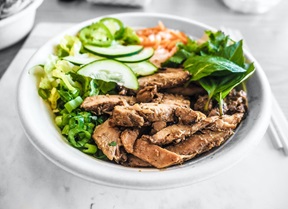Flexitarian meals have become increasingly popular in recent years, as people become more conscious of their health and the environment. This style of eating emphasizes mostly plant-based foods while still allowing for the occasional consumption of animal products. Flexitarianism offers a sustainable and realistic approach to healthy eating, making it a great choice for those who want to improve their health and reduce their impact on the environment.

One of the main benefits of a flexitarian meal is that it can help with weight loss and metabolic health. Plant-based foods are generally lower in calories and saturated fat, making them a great choice for those looking to lose weight. Additionally, studies have found that flexitarians have lower BMIs than omnivores, even when caloric intake is similar. The focus on plant-based foods also provides essential nutrients, such as fibre, vitamins, and minerals, which can help improve overall health and reduce the risk of chronic diseases.
Another benefit of the flexitarian lifestyle is its positive impact on the environment. The meat and dairy industry is a significant contributor to greenhouse gas emissions, deforestation, and water pollution. By reducing the consumption of animal products, flexitarians can help reduce their carbon footprint and contribute to a more sustainable food system.
To follow a flexitarian diet, it’s important to focus on consuming more plant-based foods such as fruits and vegetables, whole grains, legumes, nuts, seeds, and tofu. Lean sources of protein, such as poultry, fish, and eggs, can be consumed in moderation. Processed foods and red meat should be limited or avoided altogether. Meal planning is also essential, as it helps ensure that you’re consuming a balanced and nutritious diet.

Flexitarian meals can be delicious and easy to make. For breakfast, try oatmeal topped with nuts, banana slices, cinnamon, and honey. Lunch can be leftovers from the night before or a wrap filled with hummus or mashed avocado, cucumber slices, and other veggies. For dinner, stir-fry lean proteins like chicken or fish together with fresh vegetables like broccoli and bell peppers.
Conclusion:
Flexitarian meals offer a sustainable and realistic approach to healthy eating. They provide essential nutrients, help with weight loss and metabolic health, and have a positive impact on the environment. By following a flexitarian diet, you can reduce your carbon footprint while still enjoying delicious and nutritious food.




